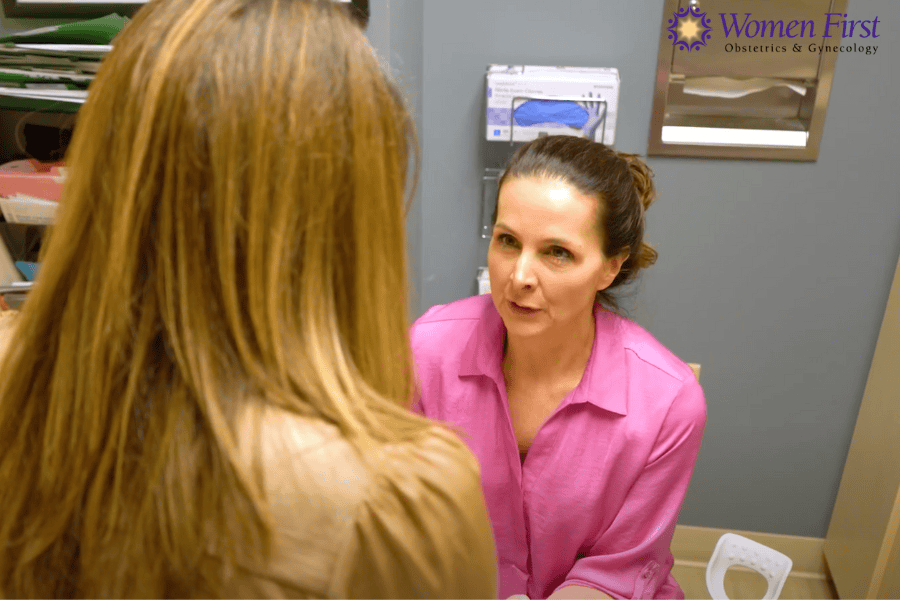- What are Bioidentical Hormones?
- What is Hormone Therapy?
- The Impact of Hormone Therapy
- Is Hormone Therapy Safe?
- When Do You Need to Take Hormone Therapy?
- Early Menopause
Hormones are vital in orchestrating many of our body’s functions, like mood regulation and menopause. But what happens when these chemical messengers fluctuate? That’s where bioidentical hormone therapy comes in.
Ann Grider, M.D., FACOG, a board-certified OB/GYN from Women First, discusses bioidentical hormones and emphasizes their reduced risk of cardiovascular complications compared to traditional hormone therapy.
What Are Bioidentical Hormones?
 Hormones act as the body’s internal communication system, sending signals to various organs and tissues. Bioidentical hormones are synthetic hormones designed to mimic the molecular structure of naturally occurring hormones in your body. This likeness allows smoother integration and absorption, making them a popular choice for many individuals needing or wanting hormone therapy.
Hormones act as the body’s internal communication system, sending signals to various organs and tissues. Bioidentical hormones are synthetic hormones designed to mimic the molecular structure of naturally occurring hormones in your body. This likeness allows smoother integration and absorption, making them a popular choice for many individuals needing or wanting hormone therapy.
Bioidentical estrogen therapy is simple. It is transdermal estrogen, not oral estrogen, which means it comes as a patch, gel, lotion, or even a vaginal ring. Bioidentical does not equate to compounded estrogen therapy. There are many FDA-approved prescription bioidentical estrogen options.
Bioidentical hormone therapy (also known as bioidentical hormone replacement therapy BHRT) can be customized to meet individual needs.
What is Hormone Therapy?
Hormone therapy, also sometimes known as hormone replacement therapy, involves using hormones to treat menopausal symptoms or for other health benefits. Hormone therapy can take various forms, including BHRT. BHRT involves replacing hormones with biologically identical compounds.
One goal of hormone therapy is to alleviate symptoms associated with the menopausal drop or perimenopausal fluctuations in hormone levels. Symptoms include hot flashes, mood swings, night sweats, poor sleep, muscle aches, and low energy levels.
The personalized nature of hormone therapy is based on a patient’s medical history, risk factors, and symptoms.
The Impact of Hormone Therapy
Whether it’s addressing symptoms of menopause or replenishing hormones lost due to aging, hormone therapy aims to treat menopausal symptoms and improve overall well-being, offering many women long-term health benefits.
From alleviating hot flashes to improving energy levels, hormone therapy offers relief from a range of discomforts. However, there are some concerns with bioidentical hormone therapy, just as there are with non-bioidentical hormones. Women with breast cancer should avoid estrogen therapy, and women with a history of blood clots or strokes should be cautious with any estrogen hormone therapy. The main benefit of bioidentical estrogen hormone therapy is that there is minimal cardiovascular or stroke risk compared to oral estrogen therapy.
Is Hormone Therapy Safe?
 While hormone therapy, including BHRT, can offer considerable benefits for managing symptoms associated with menopausal symptoms, it’s important to consider both the potential benefits and risks.
While hormone therapy, including BHRT, can offer considerable benefits for managing symptoms associated with menopausal symptoms, it’s important to consider both the potential benefits and risks.
Long-term use of hormone therapy has been associated with risks such as a small increased likelihood of blood clots, gallbladder disease, stroke, and breast cancer. The degree of risk differs depending on factors such as the type of hormones used, dosage, and individual health status. It’s important to discuss these risks with your healthcare provider and weigh them against the potential benefits before starting hormone therapy.
Non-Hormonal Medications
For individuals seeking alternatives to hormone therapy, there’s ongoing research into non-hormonal medications designed to alleviate symptoms associated with vasomotor symptoms of menopause, such as hot flashes and night sweats.
These medications aim to provide relief without the use of hormones, offering a potential option for those who may not be suitable candidates for hormone therapy or prefer non-hormonal approaches.
Want to learn more about non-hormonal medications? Talk to your doctor at Women First and see if these medications are appropriate for your situation.
When Do You Need to Take Hormone Therapy?
Hormone therapy may be recommended for individuals experiencing menopause symptoms related to drops or fluctuations in estrogen levels. (e.g., hot flashes, night sweats, vaginal dryness), or complications arising from hormone-related medical treatments (e.g., surgical menopause, hormone therapy for cancer treatment).
Talking with your doctor at Women First can help you determine if hormone therapy is appropriate for your specific situation and discuss the potential benefits and risks.
Early Menopause
Early menopause, also known as premature menopause or premature ovarian insufficiency, refers to the onset of menopause before the age of 40. This can occur due to various factors, including genetic predisposition, autoimmune disorders, medical treatments (e.g., chemotherapy, radiation therapy), surgical removal of the ovaries (oophorectomy), or other underlying health conditions.
Early menopause can lead to menopause symptoms such as hot flashes, mood changes, and vaginal dryness. More importantly, early menopause can contribute to premature aging and cardiovascular risk compared to women who go through menopause at the average age. Hormone therapy may be recommended to alleviate these symptoms and mitigate the long-term health risks associated with early menopause, such as osteoporosis and cardiovascular disease. However, the decision to undergo hormone therapy should be made in consultation with a healthcare provider, taking into account individual health status, risk factors, and treatment preferences.
Next Steps for Bioidentical Hormone Therapy
 Bioidentical hormone therapy offers a tailored approach to managing menopause, providing relief from symptoms that impact daily life. Consulting with a healthcare professional is essential to determining the most suitable action for your needs and concerns.
Bioidentical hormone therapy offers a tailored approach to managing menopause, providing relief from symptoms that impact daily life. Consulting with a healthcare professional is essential to determining the most suitable action for your needs and concerns.
